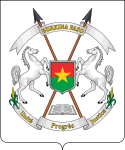This article needs additional citations for verification. (April 2018) |
 |
|---|
Burkina Faso has good relations with the European Union,[1] African[2] and certain Asian countries.
According to the U.S. State Department, "U.S. relations with Burkina Faso are good but subject to strains in the past because of the Compaoré government's past involvement in arms trading and other sanctions-breaking activity."[3] Burkina Faso cut diplomatic ties with Taiwan in May 2018 (being the most populous state to do so in the 21st century) and the foreign ministry of China stated it approved of its decision.[4][5]
Burkina Faso's relations with its West African neighbors have improved in recent years.[6] Relations with Ghana, in particular, have warmed.[7] President Compaoré had mediated a political crisis in Togo and helped to resolve the Tuareg conflict in Niger.[8] Burkina maintains cordial relations with Libya, but recalled its in ambassador in 2017 over issues of treatment of migrants trying to reach Europe, and the reemergence of the slave trade there.[9] A territorial dispute with Mali was mediated by Ghana and Nigeria, which has led to lessening of tensions between the two nations.[10]
Nineteen provinces of Burkina Faso are joined with contiguous areas of Mali and Niger under the Liptako–Gourma Authority, a regional economic organization.[11] As of 7/6/24, Burkina Faso, Mali, and Niger have turned away from the West African bloc ECOWAS to pursue their own confederation of junta states, which they claim is to create a "community of sovereign peoples far from the control of foreign powers. A community of peace, solidarity, prosperity based on our African values."[12]
Burkina Faso is also a member of the International Criminal Court with a bilateral immunity agreement of protection for the United States-military (as covered under Article 98).[13]
- ^ "Delegation of European Union to Burkina Faso Webpage".
- ^ "Global Security Article on Burkina Faso's Foreign relations".
- ^
 This article incorporates public domain material from U.S. Bilateral Relations Fact Sheets. United States Department of State.
This article incorporates public domain material from U.S. Bilateral Relations Fact Sheets. United States Department of State.
- ^ Our Foreign Staff (May 24, 2018). "Burkina Faso cuts diplomatic ties with Taiwan after intense pressure from China". The Telegraph. ISSN 0307-1235. Retrieved May 26, 2018.
- ^ "Taiwan 'won't tolerate Beijing's actions' after it loses another ally". South China Morning Post. Retrieved May 26, 2018.
- ^ "Stratfor article titled "More Drives Ivory Coast and Burkina Faso Together Than Apart"".
- ^ Owusu, Maxwell. "Burkina". A Country Study: Ghana (La Verle Berry, editor). pp. 237
- ^ "Foreign Policies". Blaise Compaore. Retrieved September 27, 2023.
- ^ "'Evacuate' migrants from Libya, urges Macron – DW – 11/28/2017". dw.com. Retrieved October 23, 2022.
- ^ Asiedu, Kwasi Gyamfi. "As violence flares in Burkina Faso, refugees trickle into Ghana". www.aljazeera.com. Retrieved July 3, 2020.
- ^ Africa, Problems & Prospects: A Bibliographic Survey. U.S. Department of the Army. 1977.
- ^ "Niger, Mali and Burkina Faso junta chiefs 'turn their backs' on West Africa bloc Ecowas". www.bbc.com. Retrieved July 12, 2024.
- ^ Kelley, Judith (2007). "Who Keeps International Commitments and Why? The International Criminal Court and Bilateral Nonsurrender Agreements". The American Political Science Review. 101 (3): 573–589. doi:10.1017/S0003055407070426. ISSN 0003-0554. JSTOR 27644467. S2CID 145263090.